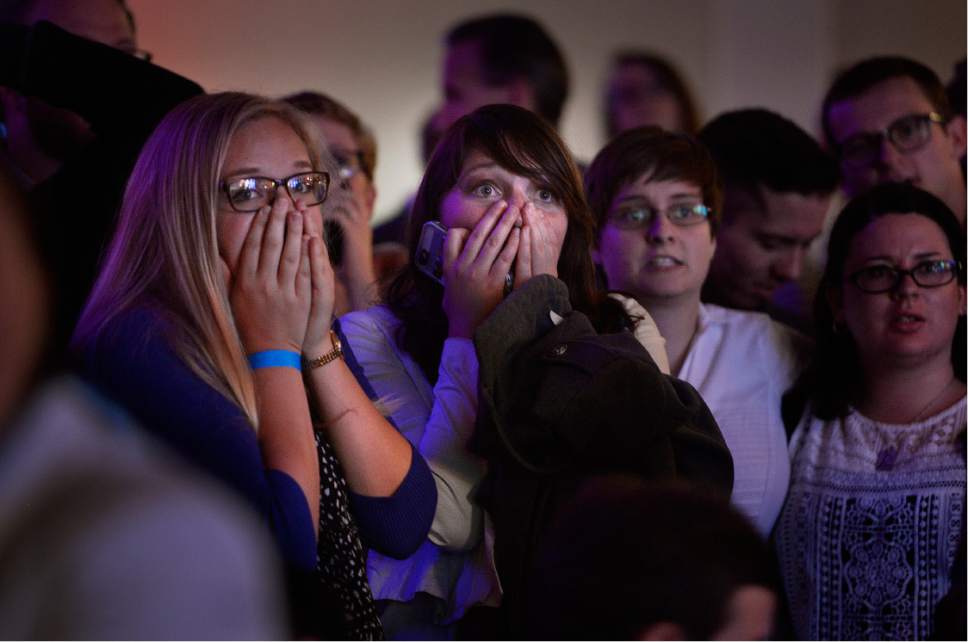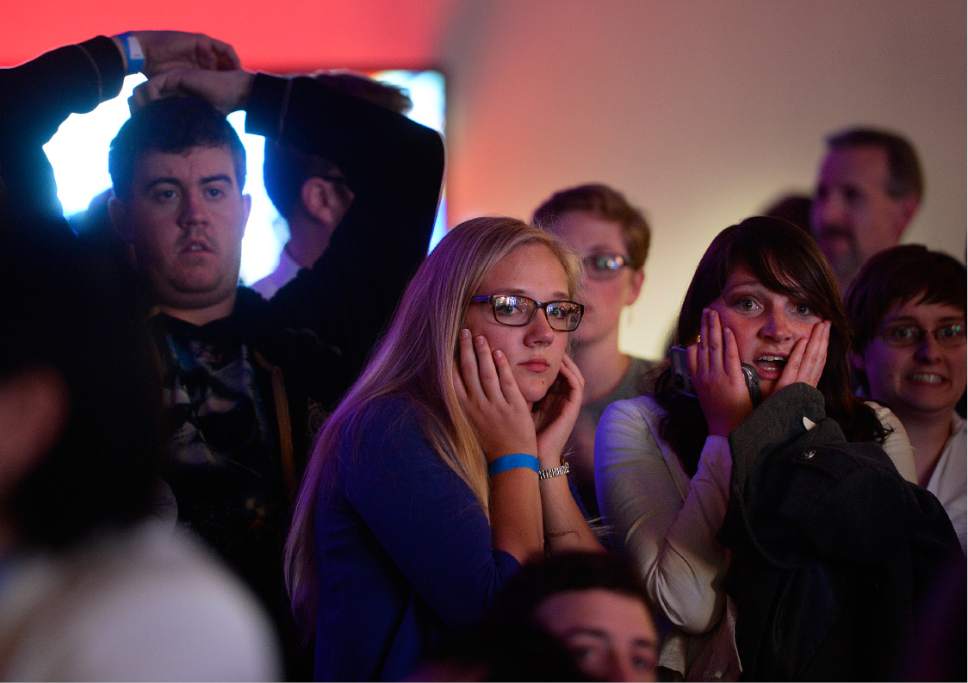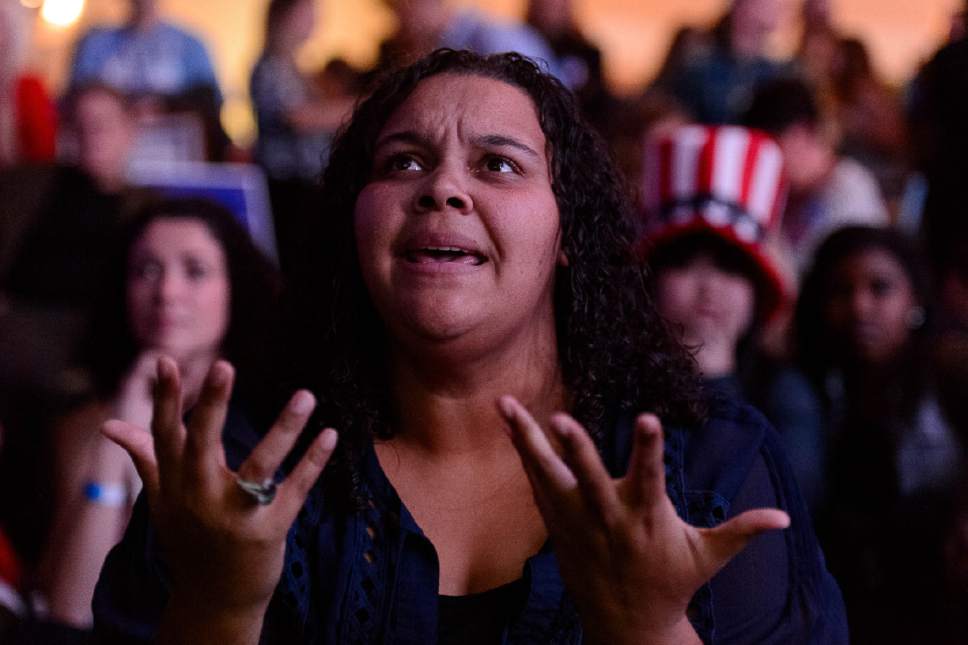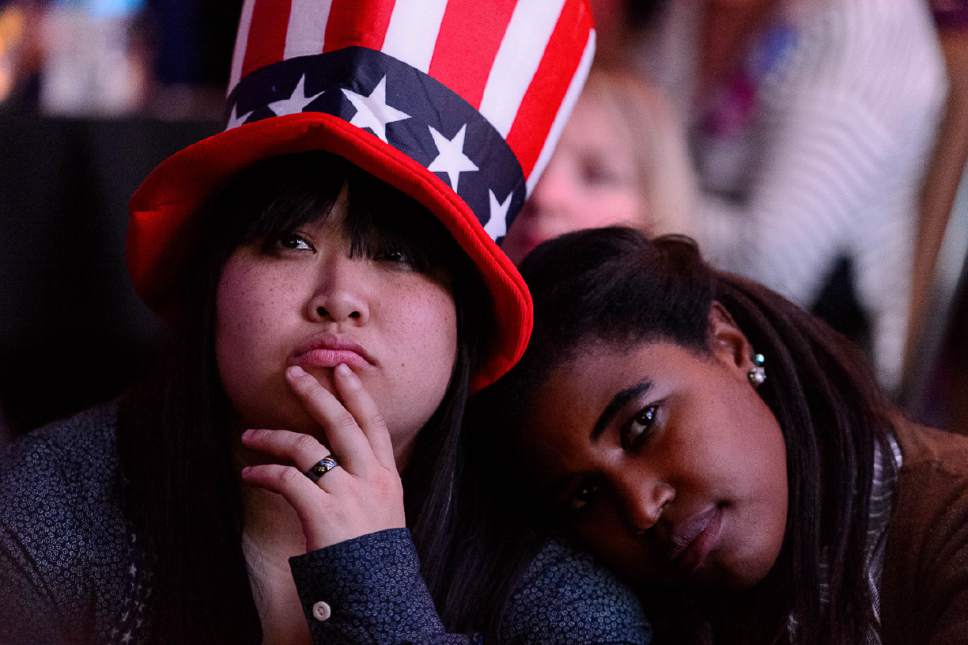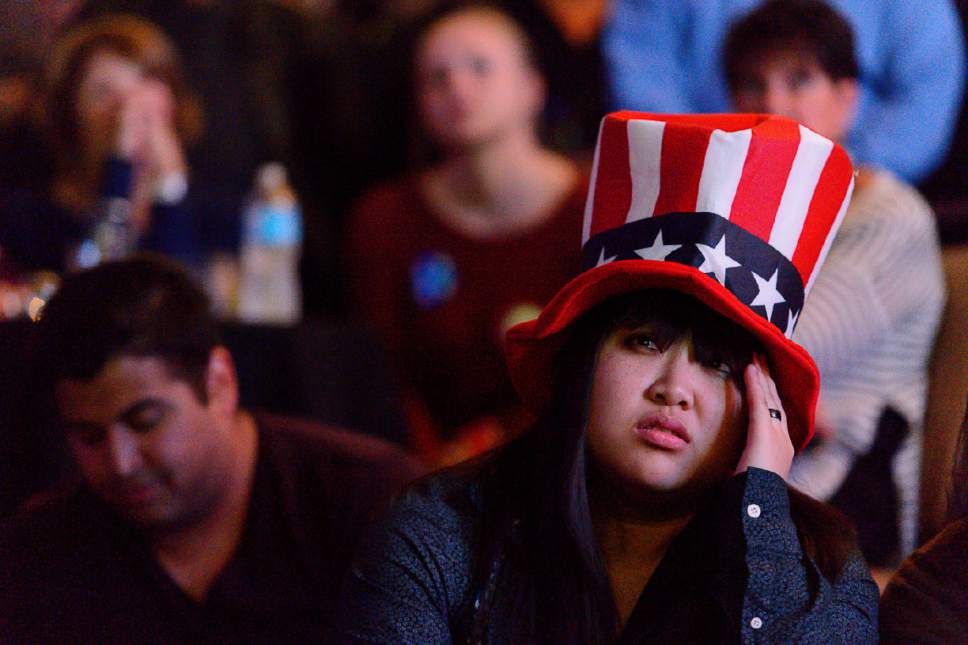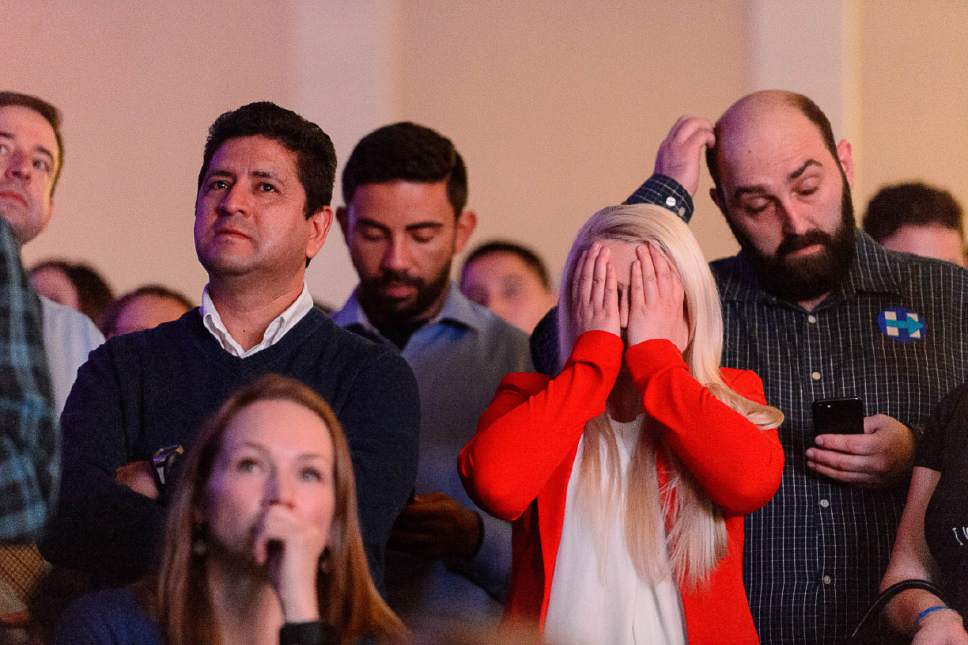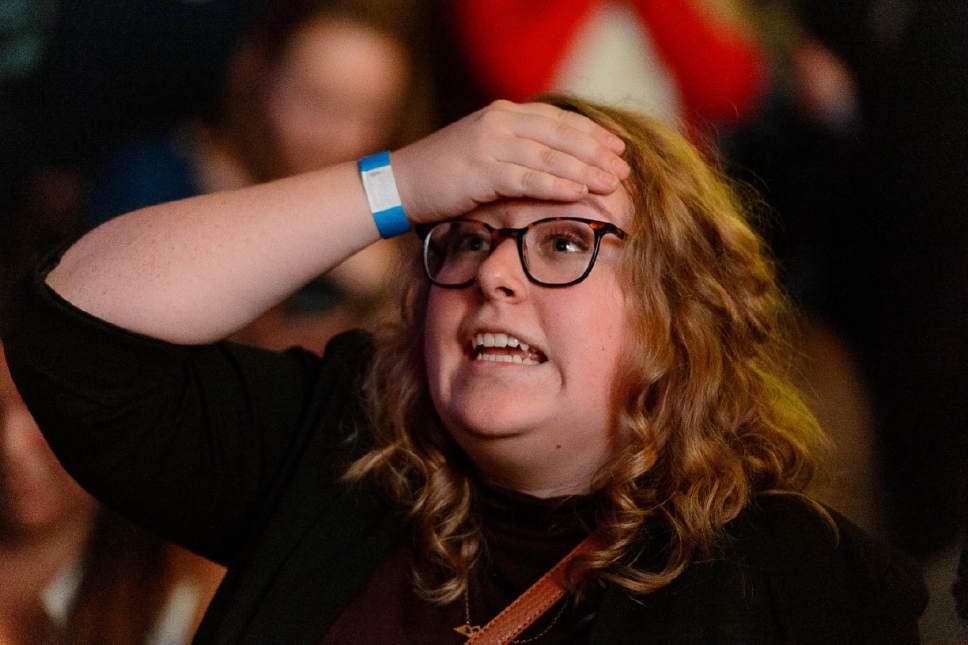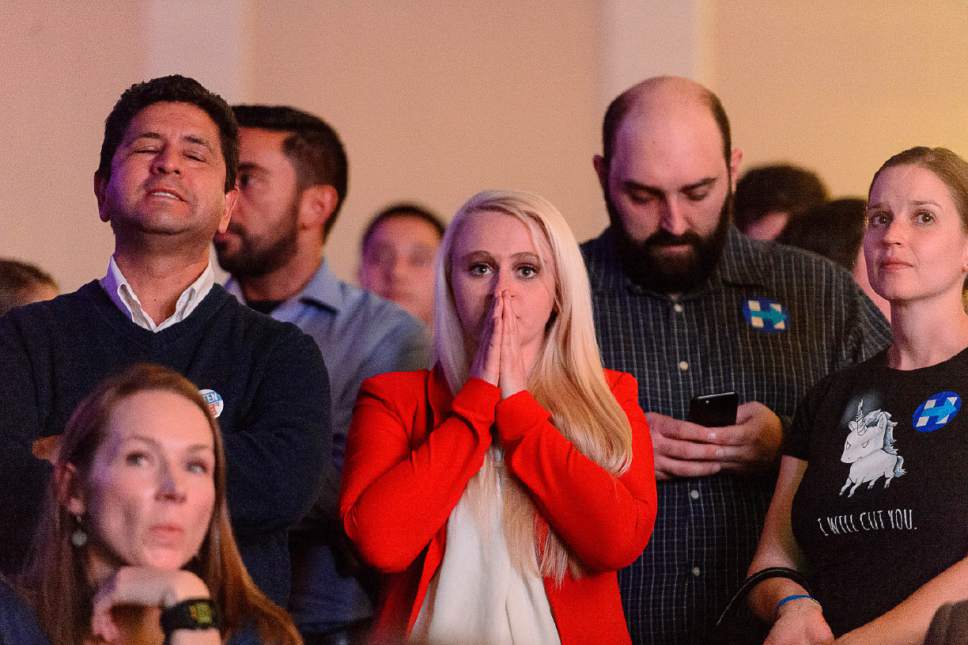This is an archived article that was published on sltrib.com in 2016, and information in the article may be outdated. It is provided only for personal research purposes and may not be reprinted.
Barbara Jones Brown watched Tuesday night's news coverage with a female cousin and their five combined daughters, ages 10 to 17.
Confident they would see a woman elected president for the first time in the nation's 240-year history, she'd bought two bottles of sparkling grape juice, to celebrate.
But anticipation soon became fear, which gave way to "devastation," she said. Swing state after swing state was called for Republican Donald Trump. At 10:30 p.m., she turned off the television, put her girls to bed and cried for hours.
Had Hillary Clinton lost to 2012 Republican nominee Mitt Romney — Jones Brown at least judged Romney a "good, honorable man." But that half the electorate backed Trump, who was recorded describing aggressive sexual conduct and has been accused of that behavior by a dozen women, leads her to question her daughters' safety.
"As a woman, to think that a man could treat women the way he does and that half of America would still want him to be our representative and leader, it's devastating," she said.
Only a third of Utah women were expected to choose Clinton, who finished a distant second despite the state's well-known distaste for Trump's statements about religion, immigration and women.
Former Utah congresswoman and Republican National Committee member Enid Mickelsen previously told The Tribune that she found Trump lacking as a role model. Still, Mickelsen said from Reagan National Airport after spending the night in the party's election war room, she was excited by the prospect of GOP control in the House, Senate and White House.
"I've noticed some people saying, 'Oh, this is because America's really sexist,'" she said. "I think that's ridiculous. This is not about Hillary Clinton as a woman, this is about Hillary Clinton as a policymaker."
Natalie Gochnour, director of the Kem C. Gardner Policy Institute at the University of Utah, was less sure of that.
Gochnour, a Republican, said Clinton was an "imperfect" candidate but that the election caused her to feel "significant disillusionment" as a woman and mother of a 25-year-old daughter.
"For me, [Clinton] definitely symbolized a woman who had dedicated her life to public service, and that, coupled with the absolutely offensive things that Donald Trump did to women during the campaign, I don't think there's any woman in America, young or old, who wouldn't feel that."
Many Utah women — particularly Democrats — were in shock Wednesday as they came to terms with a version of historic change they hadn't counted on.
Donna Kelly, a 61-year-old attorney, had said a day earlier that her eyes were welling up at the thought of a Clinton presidency. Kelly said she's heard one judge call her "Honey," another offer to adjourn a jury trial so she could cook dinner. She felt hope Tuesday. Wednesday, she felt numb.
"I just can't believe this has happened to our country," she said.
Clinton's gender didn't influence the vote of 48-year-old physician Christine Nefcy, she said, but she hoped a Clinton presidency would "start to erode those ingrained stereotypes that we have."
Nefcy said that even when she wears a white coat and a stethoscope, people often assume she's a nurse. She's also a lieutenant colonel in the Air Force Reserve, and when she arrives at the gate at Hill Air Force Base with her husband, who has never served, the guards sometimes salute him and not her.
Kirstin Urry, a 62-year-old clinical social worker who lives in Sugar House, had recalled Tuesday a time when she hadn't been able to access her checking account while she divorced her husband. Later, she'd said, she was discriminated against as a single mother trying to find housing.
Wednesday, she said, she again felt "rejected."
"So much of it is really less about a woman running against a man but a woman running against a man who has made his feelings known about people who are different than he is — women, in particular," Urry said Wednesday.
Salt Lake City real-estate developer Max Chang, 47, said he's an independent who voted on both sides of the ticket, but that it was a challenge to explain Trump's victory to his daughters, ages 6 and 3.
His oldest became upset when she learned that Trump was the likely victor, her friend having told her in all sincerity that this would mean "the dark people will have to hide."
"It kind of hurt me to hear her say that," said Chang, who is Asian-American.
He spent much of the night thinking of what he would tell her when she woke up. His eventual message: that it's the duty of members of a lawful society to accept an election result with grace, that Trump is not a dictator with unrestrained powers, and that women and Asian-Americans have come a long way since the time when they couldn't vote. His daughter can still become whatever she wants, he said.
"It's a lot to tell a 6-year-old."
There are no numbers to suggest Americans weren't willing to elect a woman, said Carol McNamara, director of Weber State's Olene Walker Institute of Politics and Political Science and board member of Real Women Run. It's encouraging to McNamara that a woman was on the ballot, and she hopes Trump will appoint thoughtful women to important positions in his administration.
"For me, those are the things that matter — and that he doesn't pursue petty vendettas against the women who spoke up against him," she said.
Mickelsen said she was "cheered" by the reparative tone of Trump's victory speech and Clinton's Wednesday morning concession.
"If we can keep that spirit, I think we can actually get some things done," she said.
For their part, Clinton's supporters said they tried to be positive by consoling friends who felt threatened by Trump's candidacy and brainstorming new vehicles for their collective energy.
Said Kelly: "I think we lick our wounds, we eat some Haagen-Dazs ice cream, and I think we pick ourselves up and we keep fighting."
Jones Brown, meanwhile, said she forced herself out of bed with the thought of her example for her two daughters, ages 14 and 10.
A historian, she thought of suffragette Susan B. Anthony, who didn't live to see the achievement of the women's vote.
"I'm trying to teach my girls that even though we've elected a president of the United States that is misogynistic and sexist and racist and xenophobic, that we have to stay strong."
When she later opened her fridge, she said, choking up, there were those two unopened bottles of sparkling grape juice.
She put them away for another time.
Twitter: @matthew_piper


